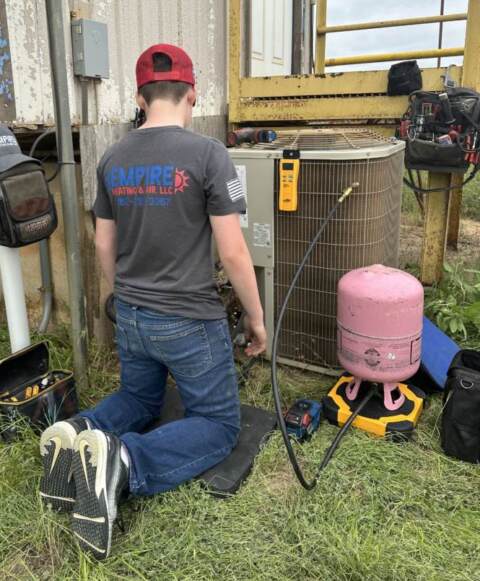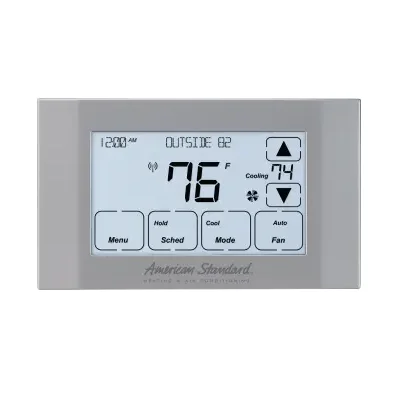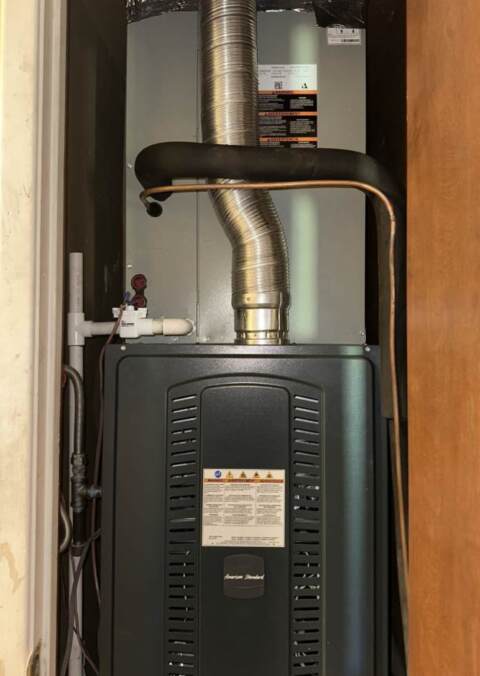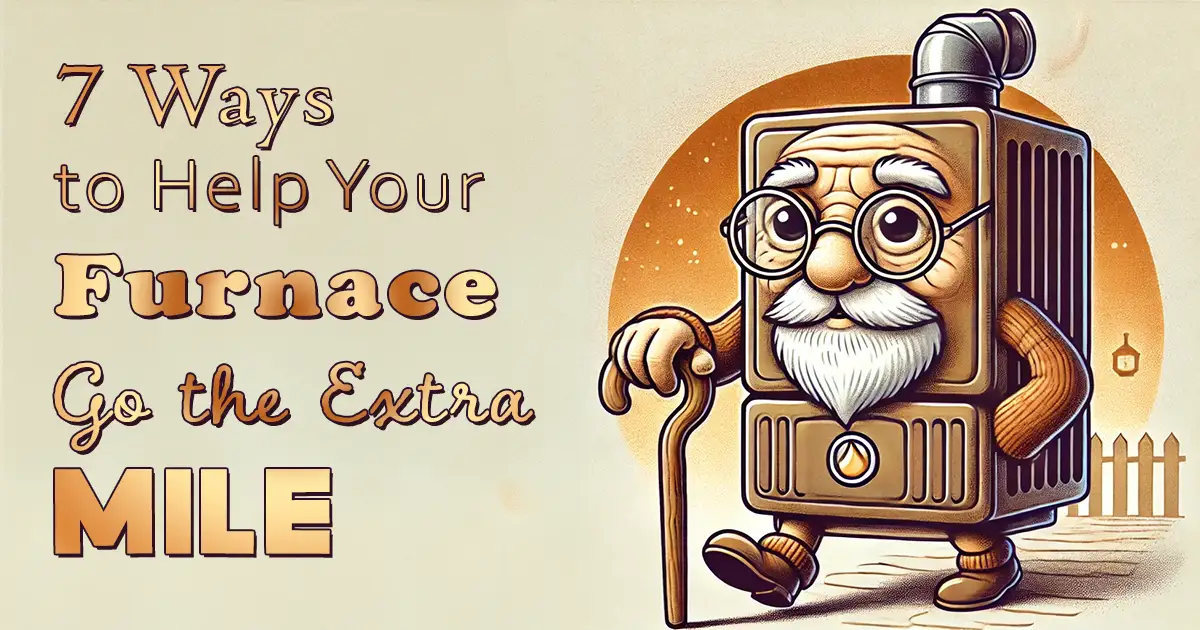During the frigid winters here in Texas, your furnace or heat pump is an essential part of your home. If it breaks down or loses efficiency, you could face costly repairs or even the need for a replacement.
The good news? With a few simple steps, you can prolong the lifespan of your furnace, reduce the chances of breakdowns, and enjoy reliable performance for years to come.
Here are a few tips Empire Heating & Air recommends to maximize your HVAC investment.
Don’t Neglect Preventive Maintenance
HVAC systems cost several thousand dollars… and keep getting more expensive every year. Proper maintenance not only saves money on utility bills… it also helps mitigate the risk of expensive repairs and extends the system’s lifespan.
Just like a car needs oil changes and tire rotations, your HVAC system needs a few tweaks here and there to stay in good working order. Ideally, you should schedule maintenance in the fall to prepare for the winter cold, and also in the spring.

Benefits of Regular Maintenance
- Catch Minor Issues Early: During a maintenance check, one of our technicians will inspect, clean, and test each component. We can spot relatively insignificant issues that could escalate into major problems, such as a worn-out belt or a dirty burner.
- Optimize Efficiency: An efficient HVAC system uses less energy, lowering monthly bills. Your technician can adjust the blower speed, check refrigerant levels, and ensure secure electrical connections, all contributing to efficient operation.
- Warranty Protection: Many HVAC warranties require regular professional maintenance to stay valid. If you skip annual servicing, you risk voiding your warranty and having to foot the bill for repairs that would have otherwise been covered.
Scheduling annual or bi-annual maintenance with Empire Heating & Air will put your system in good hands. Our technicians will make sure everything is running at peak performance, ready to keep your home comfortable year-round.
Change Air Filters Regularly
Air filters are a very integral part of maintaining indoor air quality and protecting your HVAC system. Over time, filters trap dust, pollen, pet hair, and other airborne contaminants. If they’re not changed regularly, they can become clogged, restricting airflow and forcing your system to work harder.
How Often to Change Filters
- Standard Filters: Replace every 30 to 60 days if you have pets or allergies; at most, every 90 days.
- Higher Efficiency Filters: These filters may last up to six months but should still be checked regularly.
- Re-usable or Washable Filters: These can be rinsed and reused but should be cleaned monthly.
When filters are clean, they allow air to flow freely, reducing strain on your HVAC system. If you’re unsure which filter is best for your system, give us a call and we’ll be happy to recommend the right one for your needs.
Optimize Thermostat Settings
How you use your thermostat can significantly impact your HVAC system’s lifespan. Setting it too high or making frequent adjustments can cause extra wear and tear on your furnace.

Tips for Thermostat Use
- Use a Programmable Thermostat: With a programmable thermostat, you can set your home to automatically heat or cool only when needed. For instance, set it to lower when you’re at work and bring it back up an hour before you return.
- Avoid Extreme Settings: Rather than setting the temperature drastically high or low to heat or cool your home faster, try gradual adjustments. A slight shift—say, 4-5 degrees—when you’re away helps ease the load on your system.
- Consider a Smart Thermostat: Many smart thermostats can learn your heating and cooling habits and adjust automatically. Plus, some can remind you when to change filters or schedule maintenance.
Smart thermostats are convenient for reducing energy usage and keeping your HVAC system from working too hard. We can help you choose and install one that fits your lifestyle.
Seal and Insulate Your Home
A well-insulated home can make a big difference in how efficient your furnace can be. Drafts and poor insulation allow heat to escape, forcing your system to work harder to maintain comfortable temperatures.
How to Improve Your Home’s Efficiency
- Seal Drafts Around Windows and Doors: Apply weatherstripping to doors and caulking around windows to keep air from seeping in or out.
- Check Attic and Wall Insulation: Heat rises. That means if your attic is inadequately insulated, you are losing a lot of heat to the outdoors. Adding insulation keeps warm air in and reduces the demand on your HVAC system.
- Inspect Ductwork: Leaky ducts can lose as much as 30% of your heated air. Sealing duct leaks or insulating exposed ducts can significantly improve efficiency and help your system work less hard.
Not only will these steps reduce strain on your furnace, but they’ll also make your home more comfortable and energy-efficient. Empire Heating & Air can inspect your insulation and provide expert advice on improving your home’s energy efficiency.
Clear the Area Around Your Furnace or Outdoor Unit
For an HVAC system to function properly, it needs unrestricted airflow. Clutter or vegetation around your indoor furnace or outdoor unit can obstruct this airflow, forcing the system to work harder.
Tips for Keeping Your HVAC System Clear
- Indoor Furnace: Keep the area around your furnace free from storage items. Some homeowners are tempted to use the area as storage, but this can cause reduced airflow and even pose fire hazards.
- Outdoor Unit: Ensure at least two feet of clearance around the outdoor condenser unit. Trim back shrubs and remove any leaves or debris accumulated around the unit.
- Shaded Placement: If possible, place the outdoor unit in a shaded area to prevent overheating, especially during Texas summers.
By keeping the areas around your HVAC system clear, you’ll help it perform better and reduce the risk of potential issues.
Proper Installation Matters

A proper installation is a key component to maximizing HVAC efficiency and lifespan. Systems that are improperly sized for a home often experience issues from day one.
Why Correct Installation Matters
- Sizing Accuracy: An oversized system will cycle on and off frequently, causing unnecessary wear and moisture issues. An undersized system will struggle to maintain the set temperature, leading to higher energy bills and a shorter lifespan.
- Professional Installation: Here at Empire Heating & Air, we calculate the load in a customer’s home to help choose the appropriate size of HVAC unit the home needs.
If you’re in the market for a new HVAC system, we are happy to help you find the perfect fit for your home.
Pay Attention to Warning Signs
Sometimes, your HVAC system will give you signs that it’s struggling. Recognizing these early can prevent minor issues from turning into major repairs.
Common Signs of HVAC Trouble
- Unusual Noises: Rattling, squealing, or grinding sounds often indicate loose parts or mechanical issues.
- Uneven Heating or Cooling: If some rooms are warmer or cooler than others, it may mean your system isn’t distributing air properly.
- Higher Energy Bills: A sudden increase in your energy bill could indicate that your system is working harder than it should, likely due to a hidden issue.
- Difficulty Starting: If your furnace or AC struggles to turn on, this could point to wiring issues or a failing component.
If you notice any of these warning signs, it’s best to call a professional sooner rather than later. Addressing issues early on can save money and extend your system’s life.
Final Thoughts
An ounce of prevention is worth a pound of cure, so take these few simple steps, and you’ll get more life and efficiency from your furnace.
At Empire Heating & Air, we’re dedicated to helping homeowners get the most from their HVAC systems. From regular maintenance to emergency repairs and installations, our expert technicians are here to ensure that your system keeps running smoothly for years to come. Don’t wait until there’s a problem… call us now at (682) 233-3367 to schedule an appointment or learn more about our services. Let’s keep your home comfortable and energy-efficient together.

